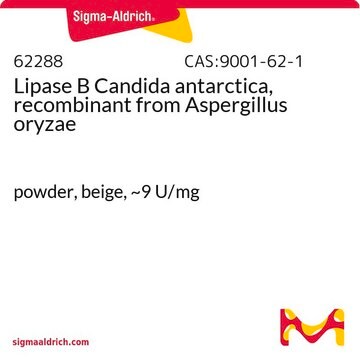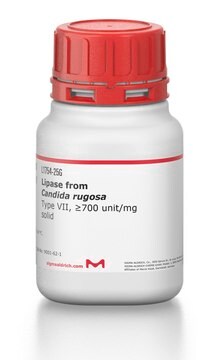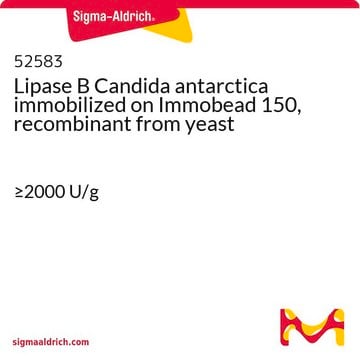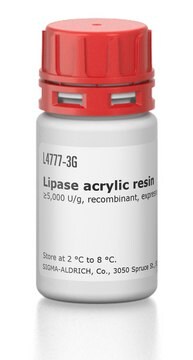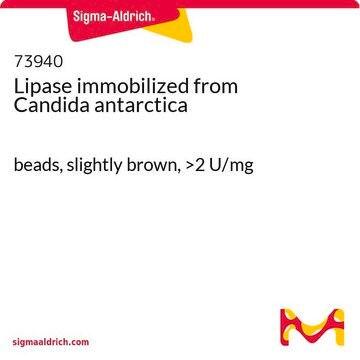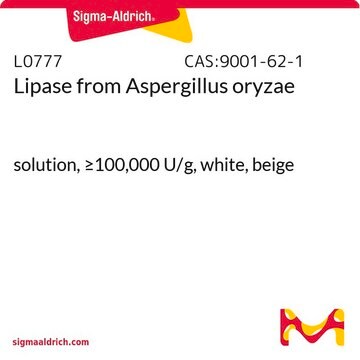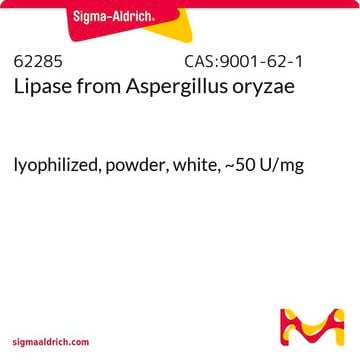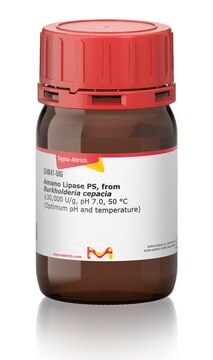62287
Lipase A Candida antarctica, recombinant from Aspergillus oryzae
powder, beige, ~2 U/mg
Sign Into View Organizational & Contract Pricing
All Photos(1)
About This Item
Recommended Products
recombinant
expressed in Aspergillus oryzae
Quality Level
form
powder
specific activity
~2 U/mg
shelf life
limited shelf life, expiry date on the label
color
beige
storage temp.
2-8°C
InChI
1S/C11H9N3O2.Na/c15-8-4-5-9(10(16)7-8)13-14-11-3-1-2-6-12-11;/h1-7,16H,(H,12,14);/q;+1/b13-9-;
InChI key
QWZUIMCIEOCSJF-CHHCPSLASA-N
Looking for similar products? Visit Product Comparison Guide
General description
Lipase A Candida antarctica (CALA) belongs to the α/β hydrolase family. The catalytic triad comprises Ser184, His366, and Asp334 residues.
Application
Lipase A Candida antarctica, recombinant from Aspergillus oryzae has been used in the enzyme-catalyzed hydrolysis studies with 3-acetylthiohexanal. It has also been used as a biocatalyst to test its effect on the esterification of phytosterol with caprylic acid.
Biochem/physiol Actions
Lipase A Candida antarctica (CALA) is a thermostable serine hydrolase with a higher sn-2 preference towards triglycerides. It displays excellent activity towards large substrates as well as bulky sterically hindered tertiary alcohols.
Lipase A from Candida Antarctica catalyzes hydrolysis of tertiary alcohols to form glycerol and fatty acids and shows selectivity for the N-acylation of β-amino esters.
Unit Definition
1 U corresponds to the amount of enzyme which liberates 1 μmol oleic acid per minute at pH 8.0 and 40°C (triolein, Cat. No. 62314, as substrate); 1 U as described above is equivalent to ~0.15 U using trybutyrine, Cat. No. 91010, as substrate, at pH 8.0 and 70°C
Other Notes
Characterization
replaced by
Product No.
Description
Pricing
Signal Word
Danger
Hazard Statements
Precautionary Statements
Hazard Classifications
Resp. Sens. 1
Storage Class Code
11 - Combustible Solids
WGK
WGK 1
Flash Point(F)
Not applicable
Flash Point(C)
Not applicable
Personal Protective Equipment
dust mask type N95 (US), Eyeshields, Gloves
Choose from one of the most recent versions:
Already Own This Product?
Find documentation for the products that you have recently purchased in the Document Library.
Customers Also Viewed
Biotechnological relevance of the lipase A from Candida antarctica
Monteiro RRC, et al.
Catalysis Today, 362, 141-154 (2021)
Integrated enzymatic production of specific structured lipid and phytosterol ester compositions
Hellner G, et al.
Process. Biochem., 45(8), 1245-1250 (2010)
Anders G Sandström et al.
Protein engineering, design & selection : PEDS, 22(7), 413-420 (2009-06-11)
We herein report the first directed evolution of Candida antarctica lipase A (CalA), employing a combinatorial active-site saturation test (CAST). Wild-type CalA has a modest E-value of 5.1 in kinetic resolution of 4-nitrophenyl 2-methylheptanoate. Enzyme variants were expressed in Pichia
Hidehiko Wakabayashi et al.
Journal of agricultural and food chemistry, 51(15), 4349-4355 (2003-07-10)
The enantioselectivity of the generation of 3-mercaptohexanal and 3-mercaptohexanol, two potent sulfur-containing aroma compounds, by lipase-catalyzed hydrolysis of the corresponding 3-acetylthioesters was investigated. The stereochemical course of the kinetic resolutions was followed by capillary gas chromatography using modified cyclodextrins as
S.A. Patkar et al.
Indian Journal of Chemistry, 76-76 (1993)
Our team of scientists has experience in all areas of research including Life Science, Material Science, Chemical Synthesis, Chromatography, Analytical and many others.
Contact Technical Service
